
Filter News
Area of Research
- Advanced Manufacturing (6)
- Biology and Environment (32)
- Clean Energy (127)
- Computational Biology (1)
- Computational Engineering (2)
- Computer Science (8)
- Electricity and Smart Grid (3)
- Energy Sciences (1)
- Fuel Cycle Science and Technology (2)
- Functional Materials for Energy (2)
- Fusion and Fission (45)
- Fusion Energy (15)
- Isotope Development and Production (1)
- Isotopes (5)
- Materials (65)
- Materials for Computing (7)
- National Security (50)
- Neutron Science (21)
- Nuclear Science and Technology (36)
- Nuclear Systems Modeling, Simulation and Validation (1)
- Quantum information Science (1)
- Sensors and Controls (1)
- Supercomputing (69)
News Topics
- (-) Composites (26)
- (-) Element Discovery (1)
- (-) Energy Storage (108)
- (-) Fossil Energy (5)
- (-) Fusion (54)
- (-) Grid (62)
- (-) Machine Learning (47)
- (-) National Security (61)
- (-) Nuclear Energy (107)
- (-) Summit (57)
- 3-D Printing/Advanced Manufacturing (120)
- Advanced Reactors (34)
- Artificial Intelligence (91)
- Big Data (53)
- Bioenergy (91)
- Biology (98)
- Biomedical (58)
- Biotechnology (22)
- Buildings (57)
- Chemical Sciences (63)
- Clean Water (29)
- Climate Change (99)
- Computer Science (187)
- Coronavirus (46)
- Critical Materials (25)
- Cybersecurity (35)
- Decarbonization (79)
- Education (4)
- Emergency (2)
- Environment (194)
- Exascale Computing (37)
- Frontier (42)
- High-Performance Computing (84)
- Hydropower (11)
- Irradiation (3)
- Isotopes (53)
- ITER (7)
- Materials (143)
- Materials Science (139)
- Mathematics (7)
- Mercury (12)
- Microelectronics (3)
- Microscopy (51)
- Molten Salt (8)
- Nanotechnology (60)
- Net Zero (13)
- Neutron Science (131)
- Partnerships (43)
- Physics (61)
- Polymers (33)
- Quantum Computing (34)
- Quantum Science (69)
- Renewable Energy (2)
- Security (24)
- Simulation (47)
- Software (1)
- Space Exploration (25)
- Statistics (3)
- Sustainable Energy (125)
- Transformational Challenge Reactor (7)
- Transportation (97)
Media Contacts
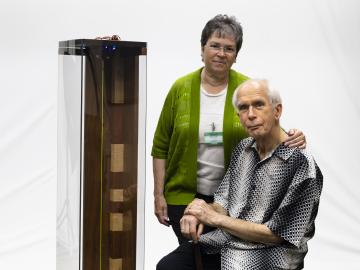
For years, Duane Starr led workshops at ORNL to help others from across the U.S. government understand uranium processing technologies. After his retirement, Starr donated a 5-foot-tall working model, built in his garage, that demonstrates vibration harmonics, consistent with operation of a super critical gas centrifuge rotor, a valuable resource to ongoing ORNL-led workshops.
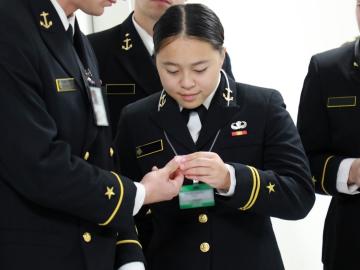
Nuclear engineering students from the United States Military Academy and United States Naval Academy are working with researchers at ORNL to complete design concepts for a nuclear propulsion rocket to go to space in 2027 as part of the Defense Advanced Research Projects Agency DRACO program.
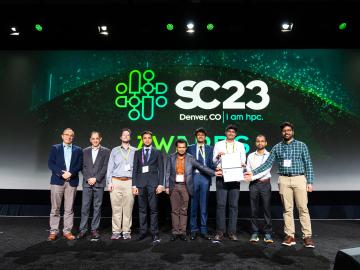
A team of eight scientists won the Association for Computing Machinery’s 2023 Gordon Bell Prize for their study that used the world’s first exascale supercomputer to run one of the largest simulations of an alloy ever and achieve near-quantum accuracy.

ORNL is leading three research collaborations with fusion industry partners through the Innovation Network for FUSion Energy, or INFUSE, program that will focus on resolving technical challenges and developing innovative solutions to make practical fusion energy a reality.

Four researchers at the Department of Energy’s Oak Ridge National Laboratory have been named ORNL Corporate Fellows in recognition of significant career accomplishments and continued leadership in their scientific fields.
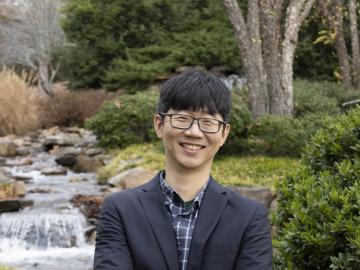
Lee's paper at the August conference in Bellevue, Washington, combined weather and power outage data for three states – Texas, Michigan and Hawaii – and used a machine learning model to predict how extreme weather such as thunderstorms, floods and tornadoes would affect local power grids and to estimate the risk for outages. The paper relied on data from the National Weather Service and the U.S. Department of Energy’s Environment for Analysis of Geo-Located Energy Information, or EAGLE-I, database.

Digital twins are exactly what they sound like: virtual models of physical reality that continuously update to reflect changes in the real world.
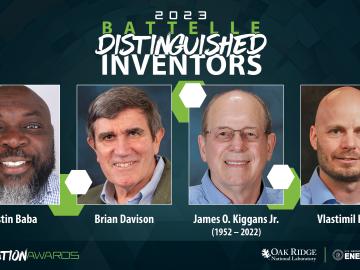
Four scientists affiliated with ORNL were named Battelle Distinguished Inventors during the lab’s annual Innovation Awards on Dec. 1 in recognition of being granted 14 or more United States patents.
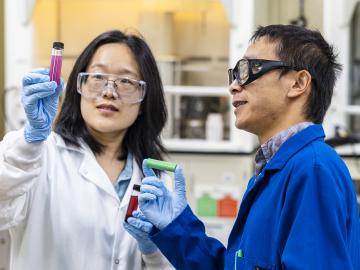
Used lithium-ion batteries from cell phones, laptops and a growing number of electric vehicles are piling up, but options for recycling them remain limited mostly to burning or chemically dissolving shredded batteries.

Scientists at ORNL used their knowledge of complex ecosystem processes, energy systems, human dynamics, computational science and Earth-scale modeling to inform the nation’s latest National Climate Assessment, which draws attention to vulnerabilities and resilience opportunities in every region of the country.


